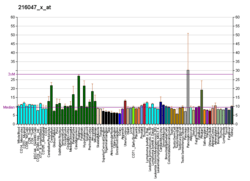SEZ6L
Seizure 6-like protein is a protein that in humans is encoded by the SEZ6L gene.[5]
References
Further reading
- Gorlov IP, Meyer P, Liloglou T, et al. (2007). "Seizure 6-like (SEZ6L) gene and risk for lung cancer.". Cancer Res. 67 (17): 8406–11. PMID 17804757. doi:10.1158/0008-5472.CAN-06-4784.
- Gerhard DS, Wagner L, Feingold EA, et al. (2004). "The Status, Quality, and Expansion of the NIH Full-Length cDNA Project: The Mammalian Gene Collection (MGC)". Genome Res. 14 (10B): 2121–7. PMC 528928
 . PMID 15489334. doi:10.1101/gr.2596504.
. PMID 15489334. doi:10.1101/gr.2596504.
- Collins JE, Wright CL, Edwards CA, et al. (2005). "A genome annotation-driven approach to cloning the human ORFeome". Genome Biol. 5 (10): R84. PMC 545604
 . PMID 15461802. doi:10.1186/gb-2004-5-10-r84.
. PMID 15461802. doi:10.1186/gb-2004-5-10-r84.
- Clark HF, Gurney AL, Abaya E, et al. (2003). "The Secreted Protein Discovery Initiative (SPDI), a Large-Scale Effort to Identify Novel Human Secreted and Transmembrane Proteins: A Bioinformatics Assessment". Genome Res. 13 (10): 2265–70. PMC 403697
 . PMID 12975309. doi:10.1101/gr.1293003.
. PMID 12975309. doi:10.1101/gr.1293003.
- Collins JE, Goward ME, Cole CG, et al. (2003). "Reevaluating Human Gene Annotation: A Second-Generation Analysis of Chromosome 22". Genome Res. 13 (1): 27–36. PMC 430954
 . PMID 12529303. doi:10.1101/gr.695703.
. PMID 12529303. doi:10.1101/gr.695703.
- Suzuki H, Gabrielson E, Chen W, et al. (2002). "A genomic screen for genes upregulated by demethylation and histone deacetylase inhibition in human colorectal cancer". Nat. Genet. 31 (2): 141–9. PMID 11992124. doi:10.1038/ng892.
- Nishioka M, Kohno T, Takahashi M, et al. (2001). "Identification of a 428-kb homozygously deleted region disrupting the SEZ6L gene at 22q12.1 in a lung cancer cell line". Oncogene. 19 (54): 6251–60. PMID 11175339. doi:10.1038/sj.onc.1204031.
- Dunham I, Shimizu N, Roe BA, et al. (1999). "The DNA sequence of human chromosome 22". Nature. 402 (6761): 489–95. PMID 10591208. doi:10.1038/990031.
- Nagase T, Ishikawa K, Suyama M, et al. (1999). "Prediction of the coding sequences of unidentified human genes. XIII. The complete sequences of 100 new cDNA clones from brain which code for large proteins in vitro". DNA Res. 6 (1): 63–70. PMID 10231032. doi:10.1093/dnares/6.1.63.
 . PMID 15489334. doi:10.1101/gr.2596504.
. PMID 15489334. doi:10.1101/gr.2596504. . PMID 15461802. doi:10.1186/gb-2004-5-10-r84.
. PMID 15461802. doi:10.1186/gb-2004-5-10-r84. . PMID 12975309. doi:10.1101/gr.1293003.
. PMID 12975309. doi:10.1101/gr.1293003. . PMID 12529303. doi:10.1101/gr.695703.
. PMID 12529303. doi:10.1101/gr.695703.





